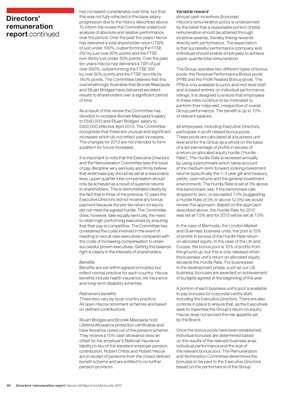
has increased considerably over time, but that Variable reward
Directors’ this was not fully reflected in the base salary
progression due to the history described above.
Annual cash incentives (bonuses)
Hiscox’s remuneration policy is underpinned
remuneration To inform the review the Committee undertook by the belief that a reasonable portion of total
report continued analysis of absolute and relative performance
over the period. Over the past five years Hiscox
remuneration should be attained through
incentive awards, thereby linking rewards
has delivered a total shareholder return (TSR) directly with performance. The expectation
of just under 100%, outperforming the FTSE is that successful performance (company and
250 by just over 60% points and the FTSE individual) should enable employees to achieve
non-life by just under 30% points. Over the past upper quartile total remuneration.
ten years Hiscox has delivered a TSR of just
over 330%, outperforming the FTSE 250 The Group operates two different types of bonus
by over 50% points and the FTSE non-life by pools: the Personal Performance Bonus pools
140% points. The Committee believes that this (PPB) and the Profit Related Bonus pools. The
overwhelmingly illustrates that Bronek Masojada PPB is only available to junior and mid-level staff
and Stuart Bridges have delivered excellent and is based entirely on individual performance
results to shareholders over a significant period ratings. It is designed to ensure that employees
of time. in these roles continue to be motivated to
perform their roles well, irrespective of overall
As a result of this review the Committee has Group performance. The benefit is up to 10%
decided to increase Bronek Masojada’s salary of relevant salaries.
to £540,000 and Stuart Bridges’ salary to
£400,000 effective April 2013. The Committee All employees, including Executive Directors,
recognises that these are unusual and significant participate in profit related bonus pools.
increases which do not reflect past increases. These pools are calculated at a business unit
The changes for 2013 are not intended to form level and for the Group as a whole on the basis
a pattern for future increases. of a set percentage of profits in excess of
a return on allocated equity hurdle (‘Hurdle
It is important to note that the Executive Directors Rate’). The Hurdle Rate is reviewed annually
and the Remuneration Committee take the issue by using a benchmark which takes account
of pay discipline very seriously and firmly believe of the medium-term forward-looking investment
that while base pay should be set at a reasonable returns (specifically the 1–3 year gilt and treasury
level, upper quartile total compensation should yields, cash returns and the general investment
only be achieved as a result of superior returns environment). The Hurdle Rate is set at 5% above
to shareholders. This is demonstrated clearly by this benchmark rate. If the benchmark rate
the fact that in three of the previous 12 years the dropped to zero, or exceeded 7.5% (suggesting
Executive Directors did not receive any bonus a Hurdle Rate of 5% or above 12.5%) we would
payment because the pre-tax return on equity review this approach. Based on the approach
did not meet the agreed hurdle. The Committee described above, the Hurdle Rate for 2012
does, however, take equally seriously, the need was set at 7.5% and for 2013 will be set at 7.0%.
to retain high-performing executives by ensuring
that their pay is competitive. The Committee has In the case of Bermuda, the London Market
considered the costs involved in the event of and Guernsey business units, the pool is 15%
needing to recruit new executives compared with of profits in excess of the Hurdle Rate return
the costs of increasing compensation to retain on allocated equity. In the case of the UK and
successful proven executives. Getting this balance Europe, the bonus pool is 15% of profits from
right is clearly in the interests of shareholders. the ground up, but this is only released when
the business unit’s return on allocated equity
Benefits exceeds the Hurdle Rate. For businesses
Benefits are set within agreed principles but in the development phase, such as our US
reflect normal practice for each country. Hiscox business, bonuses are awarded on achievement
benefits include health insurance, life insurance of budgets agreed at the beginning of the year.
and long-term disability schemes.
A portion of each business unit’s pool is available
Retirement benefits to pay bonuses for corporate centre staff,
These also vary by local country practice. including the Executive Directors. There are also
All open Hiscox retirement schemes are based controls in place to ensure that, as the Executives
on defined contributions. seek to maximise the Group’s return on equity,
Hiscox does not exceed the risk appetite set
Stuart Bridges and Bronek Masojada hold by the Board.
Lifetime Allowance protection certificates and
have therefore opted out of the pension scheme. Once the bonus pools have been established,
They receive a 10% cash allowance (less an individual bonuses are determined based
offset for the employer’s National Insurance on the results of the relevant business area,
liability) in lieu of the standard employer pension individual performance and the size of
contribution. Robert Childs and Robert Hiscox the relevant bonus pool. The Remuneration
are in receipt of pensions from the closed defined and Nomination Committee determines the
benefit scheme and are entitled to no further bonuses to be paid to the Executive Directors
pension provision. based on the performance of the Group
40 Directors’ remuneration report Hiscox Ltd Report and Accounts 2012